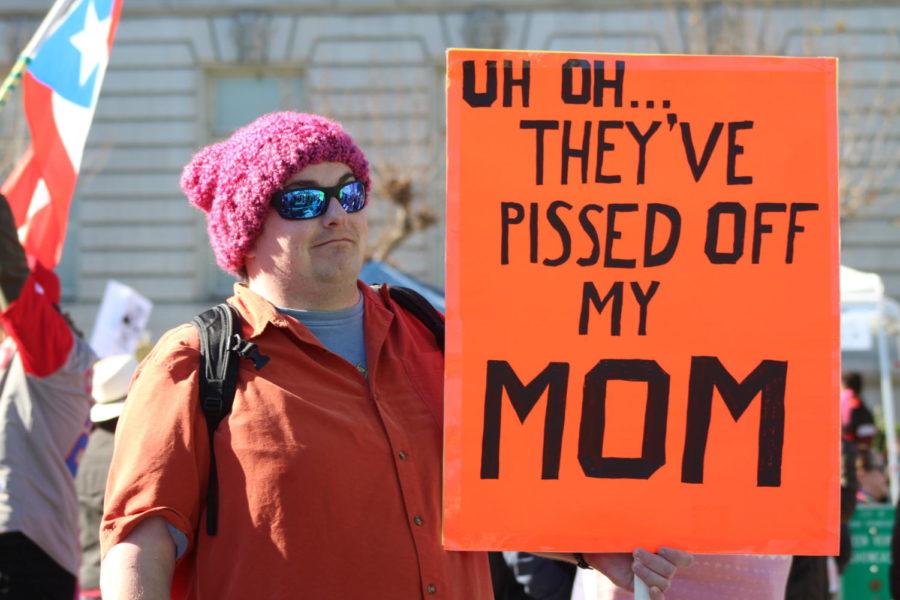San Francisco Women’s March returns with a path to the ballot
January 21, 2018
They rose. They resisted. And most notably, they repeated.
On Saturday, Jan. 20, the women of San Francisco took to the streets one year after the Women’s March on Washington with a powerful message: Hear our vote.
The San Francisco March was one of many sister marches held around the country in support of the main march, held in Las Vegas. This year, the Women’s March has a strong focus on voting and voter registration, as the 2018 midterm congressional elections loom ahead.
“I hope a whole lot more people will register to vote, and vote not just for president, but down the entire ballot. Between now and last year, we have shown that we are not alone in being outraged, and there are the actions to back things up now,” Alicia Loewenthal, a marcher and Bay Area resident said.
As marchers flooded into Civic Center Plaza, protest music played, and petitions circulated around the plaza for items such as Proposition S. Volunteers also attended to assist people in registering to vote.
“A crowd this big can’t be ignored, this energy can’t be ignored, and we all just need to get out there and vote this November. If folks don’t exercise their rights, then before long we won’t have them anymore,” Chris Paxton, who came with his mother, said.
The march began with a rally in Civic Center Plaza, and featured speakers Aimee Allison, Alex U. Inn, Brittany Packnett, Cecilia Chung, Heather Hargreaves, Jacquelynn Evans Gbogboade, Jennifer Friedenbach, Joy Elan, Kanyon Sayers-Roods, Rabbi Katie Mizrahi, Olga Talamante, Mona Laughing Brook Webb, Sadalia King, Viviana Becerra, Zahra Billoo, and Andrea Dew Steele.
“Last year’s march ignited the resistance, this year’s march is fanning the flames,” Billoo said, earning the applause of tens of thousands of people.
Stressed at the march was intersectionality, a component that many believe was left out of last year’s marches, as well as an emphasis on immigration.
“Today we are the architects of a new political and cultural era. It is an era that is led particularly by black women,” Allison said.
All of the speakers were accompanied by an American Sign Language (ASL) interpreter and space near the front for the disabled. Additionally, a trolley was provided for disabled marchers. Numbers in the high end of tens of thousands of people are estimated to have marched in San Francisco, with other Bay Area sister marches coming in at 40,000-50,000 in Oakland and 20,000 in San Jose.
“I came out here last year because I was worried and afraid of what was being promised [by the government], and many of those things are still worrisome. There is a great combination of everyone being energized and being fired up, but there is unity to that, as well as good sense of community,” Loewenthal said.
Signs carried by marchers bore sayings such as “Girl Power,” “Men of quality do not fear equality,” “Grab em by the midterms,” and “Girls just want to have fundamental rights.”
Once the speakers were done, the march began. The women and their allies, old and young, poured into the streets for the 1.7-mile walk down market and battery streets to get to the Embarcadero.
“I’m happy to be here. I came in Oakland last year, and everyone was in support of each other, and it’s good to see that again” said Laura Pitchford, who came as part of the gun sense group Moms Demand Action.
The marchers filled the streets as far as the eye could see, with no end or beginning in sight to their masses. Market Street became a sea of pink, as many marchers donned pink pussyhats. Spectators from restaurants and businesses cheered as they came by, with one building even blasting music and waving signs through their window to show support.
The march remained peaceful, but still had a clear sense of purpose and welcoming spirit, leading many men to come, as well as causing many to bring their children.
“When the women in my life invited me to come, I knew I had to be a part of this. I couldn’t not come,” Paxton said.
With the 2018 midterm elections less than a year away, the San Francisco marchers demonstrated that had not lost momentum since last year’s march, and would not be stopped.
“It’s time to take our pink hats and our signs and take our power to the polls. We are not just the women’s movement; we are a movement of women,” Allison said.



